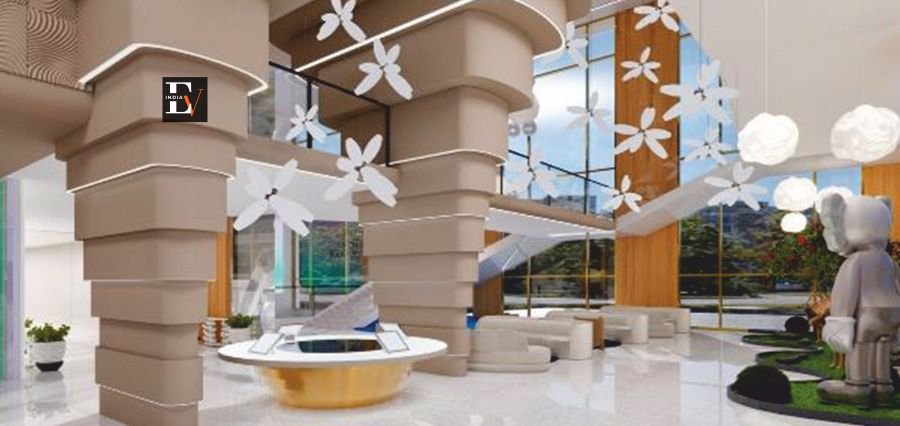The integration of aesthetic appeal and functional design has rendered interior design essential in shaping captivating living spaces. As individuals and businesses seek to enhance their environments, the demand for skilled interior designers is on the rise. This field requires creativity and a strong foundation in design principles, materials and spatial dynamics. In recognition of this requirement for professional training, esteemed institutes have emerged to nurture the next generation of interior designers.
Among these institutions, Dr. D.Y. Patil School of Design stands out as a leader in innovative education for interior design. Its vision emphasizes the development of an enlightened society through diverse disciplines, particularly positioning design as a catalyst for socio-economic growth. Committed to excellence, the school aims to shape future designers into skilled professionals and conscientious citizens ready to make positive contributions to their communities.
Mission
The mission of Dr. D.Y. Patil School of Design is grounded in the belief that high-quality education is vital for the ethical and socio-economic development of the nation. The institute offers a robust curriculum, delivered by dedicated faculty and supported by state-of-the-art infrastructure, equipping students to navigate the complexities of the modern design environment.
Interdisciplinary Learning and Industry Connections
With a focus on practical experience, interdisciplinary collaboration and sustainability, the school ensures that its graduates are well-prepared to address contemporary design challenges. The learning environment develops creativity, innovation and critical thinking, enabling students to engage in hands-on projects, internships and industry partnerships that provide invaluable real-world experience and help build strong professional networks.
The curriculum is continually updated to reflect emerging trends and technologies, positioning students at the forefront of the interior design field. By embracing interdisciplinary practices and promoting a culture of collaboration, Dr. D.Y. Patil School of Design prepares its students to thrive in a globalized world. This forward-looking perspective empowers graduates to become leaders in sustainable design and innovative problem-solving, contributing to a culturally and economically vibrant India.
Developing Leadership Skills in Design Education
Dr. D.Y. Patil Vidyapeeth (Deemed to be University), located in Pimpri, Pune, is recognized as one of the top 50 universities for its excellence in education across India. It offers a dynamic and comprehensive educational experience through its 14 constituent units, which encompass health sciences, allied health sciences, liberal arts, management, biotechnology, science and technology, and the School of Design.
The institution is committed to preparing students for professional success and becoming innovative leaders imbued with a strong sense of social responsibility and a readiness to shape the future.
Dr. D.Y. Patil School of Design, situated in Tathawade, Pune, distinguishes itself with a user-centric approach to interior design. The school operates on the belief that every individual possesses the potential to become a skilled designer and innovator. Its mission extends beyond merely educating effective leaders; it aims to refine these individuals within their respective communities.
Dr. P. D. Patil, Chancellor, of Dr. D. Y. Patil Vidyapeeth recognized the transformative power of education and sought to create an environment conducive to holistic student development. Over the years, this focus has broadened to encompass various educational aspects, including creativity, collaboration and responsiveness to society’s growing requirements.
The university has continually adapted its course content, curriculum and learning resources to align with emerging industrial demands while nurturing the aspirations of its students.
Bridging Theory and Practice in Interior Design
Dr. D. Y. Patil School of Design distinguishes itself through its extensive and user-centric approach to interior design. Unlike many institutions that focus primarily on the aesthetic aspects of design, courses at the institute of design emphasize that design transcends a functional ability along with visual appeal; fundamentally about creating spaces, where individuals can thrive and engage with one another.
The curriculum incorporates fundamentals related to sustainable design, practical application and innovative principles, thereby equipping students not only to be designers but also to understand the impact of their designs on human behaviour and the environment. To further this aim, the school emphasizes practical, out-of-class experiences through group assignments and internships, setting it apart from other educational institutions that follow a conventional approach. Students engage in projects that require collaboration with industry professionals, gaining essential experience for their transition into the workforce.
To ensure that students remain current with industry trends, Dr. D. Y. Patil School of Design actively establishes and maintains relationships with various organizations and industries. The institute regularly invites guest speakers who are veterans in the fields of design and innovation, enhancing the educational experience.
Students benefit from exposure to workshops, seminars and study tours to design exhibitions and companies, which keeps them informed about the latest developments and technologies in the industry.
Cultivating a New Generation of Responsible Designers
At Dr. D.Y. Patil School of Design, the design philosophy is broadly categorized into three main areas: creativity, sustainability and social responsibility, all centered around innovation and design. This philosophy is integrated into the curriculum and the various projects undertaken by students.
- Creativity: The institution encourages students to challenge conventional design methods by exploring new materials, emerging techniques and innovative approaches to contemporary problems. This emphasis on creativity fosters a spirit of experimentation and innovation among the students.
- Sustainability and Social Responsibility: Students are educated about the societal impact of their designs. They learn how to create structures that are accessible to everyone, including individuals with disabilities. This understanding instils in them the belief that their work can benefit all members of society.
These principles provide students with a foundational understanding of interior design, guiding them to create spaces that enhance the quality of life for individuals.
Merging Aesthetics, Function and Sustainability
The central philosophy of the institute—creativity, functionality and sustainability—reflects the belief that great design transcends aesthetics; it is fundamentally about solving problems, improving lives and being environmentally conscious. This philosophy permeates all programs, influencing both the teaching of design principles and the practical work conducted by students.
The curriculum promotes creativity through open-ended project assignments that allow students to express their unique design perspectives. Functionalism is emphasized through a human-centered design approach, ensuring that every space serves its users effectively.
A critical component of this philosophy is sustainability, where students are taught to incorporate environmentally friendly practices into their work, with a focus on eco-friendly materials, energy efficiency and low-carbon construction techniques.
Industry Collaborations Enhancing Design Learning
At Dr. D. Y. Patil School of Design, the principle of “learning by doing” is central, exemplified by the slogan “practical experience.” The school prepares students for the professional world through internships, live projects and industry collaborations. Students gain valuable work experience with leading design firms, architects and real estate developers, enhancing their skills and networking opportunities.
The school also organizes simulation exercises and competitions with top companies, allowing students to tackle real design challenges while receiving mentorship from industry professionals. Numerous collaborations with hospitality brands, commercial developers and residential design firms focus on innovative solutions, including experimental spaces like luxury hotels and urban housing.
Emphasizing sustainability, the school partners with environmentally conscious firms that use renewable construction techniques, teaching students to merge eco-friendly practices with appealing designs. These diverse projects illustrate the vast opportunities within the interior design industry, equipping students for future success.
The Impact of Technology on Modern Interior Design
At Dr. D.Y. Patil School of Design, faculty development is paramount, with educators dedicated to lifelong learning and professional growth through active industry practice. Faculty members regularly attend international design expos, conferences and workshops to stay updated on growing trends and technologies.
Their involvement in research and consultancy provides firsthand insights that enhance student learning, making their mentorship essential in navigating the dynamic design environment.
- Sustainability is integral to the curriculum, emphasizing the environmental impact of design choices. Students learn sustainable design principles, from material selection to energy-efficient construction techniques, preparing them to create aesthetically pleasing and ecologically responsible spaces.
- Innovation is equally prioritized, with the curriculum incorporating the latest technologies, including smart home solutions and green architecture. This equips students to become industry leaders capable of addressing contemporary challenges while promoting sustainability.
- Student feedback is highly valued, with regular surveys, open forums and mentorship sessions conducted to gather opinions on course content and teaching methods. Suggestions are carefully reviewed and inform curriculum enhancements, ensuring that the educational experience continually evolves to meet the needs of students and the industry.
The Importance of Diverse Perspectives in Design Education
Collaboration and creativity are fundamental to the pedagogy at the Dr. D. Y. Patil School of Design. The campus is designed to foster this environment, featuring open studios, common work areas, and project rooms where students from various disciplines can collaborate effectively. Faculty members actively encourage this collaborative spirit by assigning cross-department projects, allowing students from interior design, graphic design and product design to work together on complex interdisciplinary assignments over a semester.
The institution believes that exposure to diverse perspectives enhances creativity. To cultivate this, the curriculum incorporates cross-references among different design disciplines, reflecting the reality of professional life where designers often collaborate with individuals who have varying educational backgrounds. The institute’s placement cell is dedicated to ensuring students are well-prepared for the competitive job market. It offers portfolio development, resume writing and interview preparation workshops, followed by mock interviews conducted by industry professionals.
The institute has established partnerships with leading companies and design houses through Memorandums of Understanding (MoU’s), which provide students with access to top-level job opportunities upon completing their programs. In addition to placement services, the institution emphasizes the importance of courses that develop entrepreneurial skills for graduates. Courses in business management, marketing and client relations are particularly beneficial for students interested in establishing their design firms, equipping them with essential tools for success as entrepreneurs in the design industry.
The Impact of Real-world Projects on Design Learning
Dr. D. Y. Patil School of Design aims to challenge the status quo in design education by further integrating technology and expanding sustainability initiatives. The institution seeks to establish international partnerships that provide students with diverse global exposure, focusing on real-world projects in smart city design and sustainable urban development.
Recognized as a leading interior design school, it nurtures emerging talents through a curriculum that balances essential design principles with the latest trends. Practical experiences such as projects, internships and industry collaborations help students build strong professional networks, while an emphasis on entrepreneurship prepares them for successful careers.
Experienced faculty promote teamwork, creativity and critical thinking in a friendly environment that values innovation and sustainability. For aspiring interior designers, choosing Dr. D. Y. Patil School of Design equips them with the creativity, technical skills and practical training needed to transform spaces into dynamic works of art and functional expressions, shaping the future of interior design.





